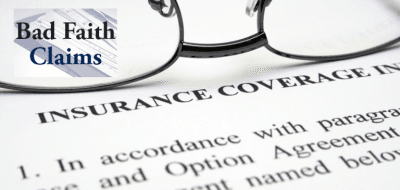We call on our insurance companies at the times we need them most, such as when issues arise regarding our cars, homes, or automobiles. An issue with one’s coverage can have severe consequences. At its core, an insurance bad faith claim is based on one’s insurance either delaying or failing to pay for benefits due under an insurance policy.
“Bad faith” does not necessarily connote malicious or immoral conduct on the part of the insurer. When an insurer fails or unreasonably delays payment under a contract, the plaintiff has a few different options as to what claims to bring. In a contractual context, one claim the plaintiff is likely to assert is a breach of the covenant of good faith and fair dealing. The covenant of good faith and fair dealing is an underlying assumption of contract law; it is the notion that people will follow the terms of the contract honestly, fairly and in good faith.
According to the California jury instructions (CACI 2331), essential factual elements of a plaintiff’s breach of the implied obligation of good faith and fair dealing claim include[1]:
- That plaintiff suffered a loss covered under an insurance policy with defendant
- That defendant was notified of the loss;
- That defendant unreasonably failed to pay/delayed payment of policy benefits;
- That plaintiff was harmed; and
- That defendant’s failure to pay/delay in payment of policy benefits was a substantial factor in causing plaintiff’s harm
On the other hand, an insurer can also be liable under tort law for failing to reasonably investigate a plaintiff’s insurance claim. “An insurer must give at least as much consideration to the interests of the insured as it gives to its own interests. When the insurer unreasonably and in bad faith withholds payment of the claim of its insured, it is subject to liability in tort.”[2]
California jury instructions (CAJI 2332) indicate that a first party bad faith claim should allege[3]:
That defendant acted unreasonably, that is, without proper cause, if it failed to conduct a full, fair, and thorough investigation of all of the bases of the claim. When investigating the plaintiff’s claim, the defendant had a duty to diligently search for and consider evidence that supported coverage of the claimed loss.
Our attorneys are experienced in investigating and litigating insurance bad faith. If you believe you were wronged by an insurer, call our experienced lawyers to preserve your legal rights.
[1] Judicial Council Of California Civil Jury Instruction 2331, Judicial Council Of California Civil Jury Instruction 2331.
[2] Frommoethelydo v. Fire Ins. Exch., 42 Cal. 3d 208, 215, 721 P.2d 41, 44 (1986).
[3] Judicial Council Of California Civil Jury Instruction 2332, Judicial Council Of California Civil Jury Instruction 2332.


